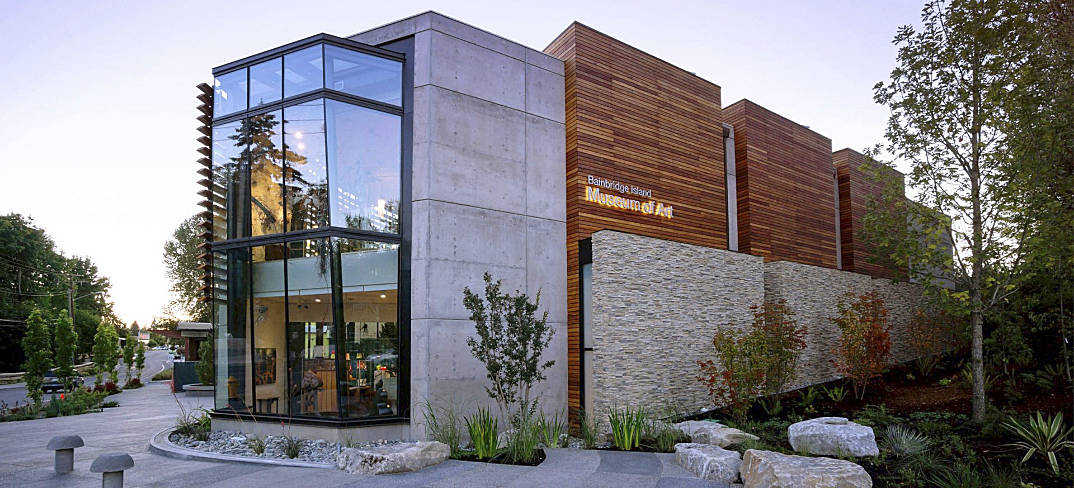By Kate Stringer
UW Graduate School
As the COVID-19 pandemic started closing museums, museums also started cancelling their student internships.
Dylan High, graduate advisor for the University of Washington Museology program, wanted to find a way to support museums with the problems they were facing and give the Museology master’s students a way to access internships remotely.
“We want students to be prepared to take on these big problems and these things that museums are grappling with,” High said. “If they can find meaningful ways that they can demonstrate that skillset now, then they’re going to be in such a better position being able to do that and having the confidence that they can do that as they move into the workforce.”
To meet these needs, the Museology team created a problem-based summer internship program.
Museology graduate students and alumni who had just graduated in 2020 worked in teams with six museums across Washington, including the Bainbridge Island Museum of Art and Bainbridge Island Historical Museum, to provide students with paid experiences and community partners with extra help during a challenging moment. Most importantly, it allowed communities to virtually access their museums during a pandemic.
While students brought skills and experiences to the museums, the museums provided opportunities for student growth.
Devonshire Lokke interned for the Bainbridge Island Museum of Art. The museum wanted a toolkit to help start conversations about race and anti-racism with its board, staff, and eventually, community members. The importance of the work was intimidating to Lokke, who questioned whether she was the right person to do it. But through dialogue and collaboration with her teammates, Lokke realized that even though she didn’t consider herself an expert on the subject, that didn’t mean she couldn’t participate.
“You’re never going to grow professionally or personally if you look at a problem and say, ‘It’s too big for me,’ or ‘I’m not qualified to do this.’” Lokke said. “That concept of doing the best you can and bringing yourself up to a high bar and having an idea instead of doubting it and rolling with it and seeing what comes of it was a good lesson from this experience.”
Lokke and her teammates created an anti-racist toolkit for the museum amid the national dialogue around racial justice and Black Lives Matter protests over the summer. The toolkit includes a glossary of terms and discussion prompts for talking about racism and privilege. They also created cards with concrete actions the organization could take to make steps toward becoming anti-racist. The cards also included organizations that could provide further support or resources on those topics.
Students also took on projects museum staff hadn’t had time to dig into. The Bainbridge Island Historical Museum had just developed a new website, and graduate student Em Hall was tasked with beginning the work of increasing web accessibility for people who had vision-impairments, specifically, through the use of alt text.
WIth her computer monitor turned off, Hall used a screen reader to comb through the website so she could understand what the experience was like for people who couldn’t see. She researched best practices for how alt text should be written and she created resource documents for museum staff.
Museum leaders said those types of projects were especially helpful during this time.
“I only knew that there was something out there that we needed to do better, but I really had no expertise about the details of it. But (Em Hall) just dug in and figured that out,” said Merilee Mostov, the museum’s director of exhibits and engagement. “It’s just an example of how helpful a grad student in Museology can be – to provide new ideas, new strategies, new work habits and new best practices for us.”
Mostov said museum directors and curators were strapped for time trying to move current exhibits online. Mostov’s new exhibit, Her Vote. Her Story, commemorating the 100th anniversary of the 19th Amendment, was open for one week when the pandemic hit and the museum closed. So Mostov filmed the exhibit to allow the community a virtual experience, as well as started a video project called the Curious Curator, which shared different Bainbridge Island stories with the community.
This new method of finding internships helped bridge an equity challenge for students, some of whom faced additional stress and responsibility from the economic and social impact of the pandemic. Rather than applying to 10 internships, they could submit their applications and be matched with an internship. The students were paid through Museology’s paid internship program, a pilot that is now in its third year.
“This type of partnership allows for students and organizations to make connections more efficiently, which is a big issue of equity, because the amount of time and energy students have to pursue things outside of their coursework is tied to other life factors,” Hall said. “If I’m working or raising a child or on the bus for two hours a day, I might not have the same amount of time to devote to applying to internships as other students might.”



